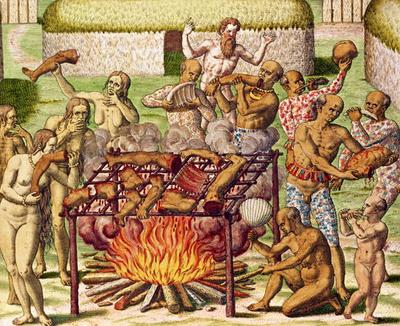The promethean spirit of the Renaissance man, forever inciting him to ”undertakings of high and sacrilegious daring,” is one of the major themes of ”The Lusiads” of Luiz Vaz de Camoens, or Camoes( 1524-1580 ) in his native Portugal. ”No contemporary work,” declared Hernani Cidade, the leading Portuguese authority on Camoens, ”expresses so eloquently the proud euphoria of the century that Taine called the greatest in history”.
The Lusiads is the epic not only of Portuguese imperialism but of the new, complex, kinetic civilization that was being founded by the western tribes of man, conquering the oceans and the continents by daring themselves to do so, and then summoning the conquered peoples of the world to share in the West’s worship of its own audacities.
The Portuguese in ”The Lusiads” espitomize the general European vocation of conquest over man and nature. Of course Camoens an intra European hieracrchy of achievement. It is indicated in Canto II, when Da Gama briefs his African host, the friendly king of Malindi, on European geography. In rhe great mariner’s perspective, Europe’s head, if you hold the map as any God-fearing Christian naturally holds it, was ”noble Spain”, whose conquests in the West are generally acknowledged in a later passage. Then, ‘,Plac’t as the crown upon fair Europe’s head,” comes Da Gama’s, and the poet’s native land, Portugal.
While some Europeans are thus more European than others, the continent is the general fatherland of conquering heroes. Its civilization ”which surpasses and eclipses all others”, is Christian even when heretical, but Camoens’s Europe, unlike Dante’s is not just Christendom. His very use of Europe, which was then considered a humanists’ word, marks him as a precursor. According to Pierre Chaunu, Europe was born in the seventeenth century. Camoens’s Europe is Christendom magnified by its own growth and dialectically energized by the rediscovery of pagan antiquity. Its children are the descendants of Crusaders and the heirs of Rome. Empire, like victory, is in their blood.
In the history of modern colonialism, the symbolic Da Gama of The Lusiads marks an evolutionary link between the early generation of colonial crusaders, or pseudo crusaders, and the lordly nineteenth-century white man with his assumed innate superiority of character and his accelerating technology of conquest. This hybrid might be called the Invincible European. His concept of what a later age would term the civilizing mission, before it became the white man’s burden, is rudimentary but the compulsion to spread his way of life, along with ”religion true”, throughout the four corners of the world is evident from the outset.
Already, he exhibits an embryonic sense of racial superiority, though not, so far, of obsessive color prejudice. He does not think of India as being peopled by ”natives”; to Camoens they are Brahmans, idolators or gentiles, but he detects what might be termed prenativistic tendencies in their behavior. Specifically, their ”treachery”, and their unspeakable sex habits. Similarly, Africans,though not despised for being black, are looked down on as ”savages”.
Oddly enough, despite its typical colonialist prejudices and self glorification, and despite the official cult of Camoens in Portugal, ”The Lusiads” is not a propaganda tract for colonialism. Camoens appears to harbor no doubts that colonialism was good for the colonized, but very serious ones about whether it was good for the colonizers. Like certain later travelers in the East, he tended
blame the degeneration of European character that he had observed there, and perhaps experienced there himself, on the corruption of Asia rather than on those of power, but he was consistently outspoken in denouncing it. It was the existential rewards of the colonial adventure that he most valued, and he lamented their decay into cynical hedonism.
Camoens likewise came to realize that the continuous emigration of vigorous young males from the metropolis to the colonies, especially under the murderous conditions of sixteenth-century sea travel and life in the tropics, was a demographic hemorrhage that was ruining the nation’s health. He knew that Manuel the Fortunate’s strategy of economic warfare against islam had failed, and that Arab merchants throughout the Indian Ocean were gradually recovering a share of the spice trade, sometimes with local Portuguese connivance. His own misfortunes had sensitized him to the injustices, even from the Portuguese point of view, of a colonial system that enriched a hoggish vested minority while the living standards of the general population at home were declining. There are even hints in ”The Lusiads” that the poet was sickened in retrospect by the atrocities of colonial warfare he had witnessed, perhaps himself committed.

''Sea monster in Pedro Magalhães de Gândavo, Historia da Província de Santa Cruz a que vulgarmente chamamos Brasil, Lisbon, 1576.''
Camoens’s doubts about the moral and practical validity about Portuguese colonialism in his day, and his prescience of more tragic evils to come, are expressed in ”The Lusiads” as delusive grandeur at the expense of toil and sacrifice; a form of critique of colonial policy borne of the ego, vanity and self stylings of Manual I, as a form of latter day Alexander the Great. Infortunately, Camoens’s warning, though certainly more than a poetic convention, was not the principal message of ”The Lusiads”. His emotions were trapped in the new mythology of heroism and empire that his own genius had created; resulting in what late became in Portugal, both a symptom and a cause for national obsession and from which his countrymen remained so entrapped for so long.
The systematically encouraged inflow of white settlers helped aggravate interracial tensions and to develop unmistakeable racist attitudes among the ruling white minority; and Camoens, the poet of empire became a part of his countrymen’s dreams.











 COMMENTS
COMMENTS



